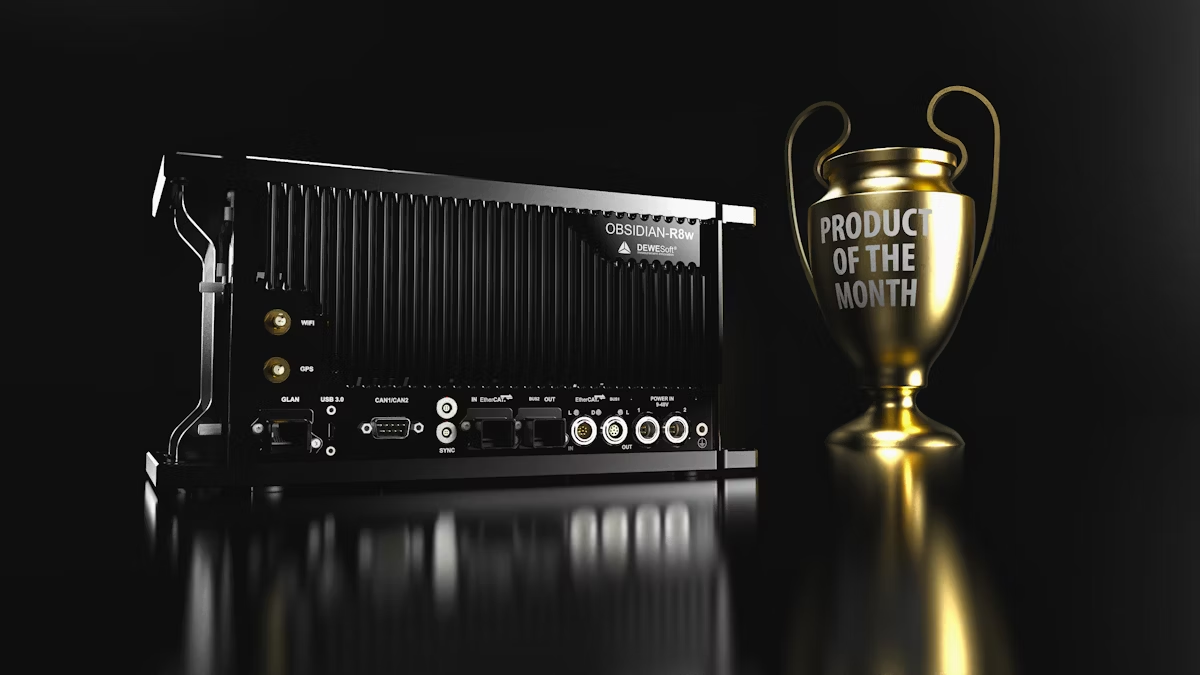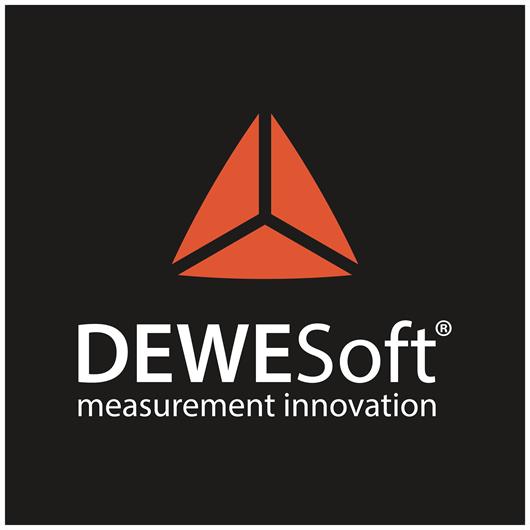 Add My Company
Add My Company

The editors at NASA TECH Briefs have selected Dewesoft’s OBSIDIAN as their product of the month. The technical journal has recognized several of the company’s products, including the DEWE-43 portable DAQ instrument, which ultimately won the prestigious Product of the Year award.
OBSIDIAN® is a breakthrough DAQ (data acquisition) instrument that combines the best features of a high-end DAQ system, a long-term datalogger, a real-time EtherCAT data server, and a signal conditioning front end.
Traditional high-speed DAQ systems are typically used for a few hours at a time. Most DAQ instruments or software are based on the Windows operating system, which is not designed for long-term stability. However, numerous applications require the measurement system to operate for weeks, months, or even years. Accordingly, OBSIDIAN is built on a low-power ARM processor running an open-source LINUX® operating system and DewesoftRT DAQ software. This architecture allows OBSIDIAN to operate for extended periods of time without intervention. It can be remotely monitored and controlled via the DewesoftM app on iOS or Android phones and tablets or by computers running DewesoftX software.
OBSIDIAN Models
Long-term recording applications often require a rugged instrument, so OBSIDIAN is CNC machined from a solid aluminum block. The OBSIDIAN R8 has liquid and dust protection to IP50 and operates in temperatures from -10 to 50°C (14 to 122 °F).
The OIBSIDIAN R8w is liquid and dust-proof up to IP67 and operates in extreme temperatures from -40 to 85°C (-40 to +185 °F). Built for unfriendly environments, It can handle shocks up to 75 G and meets MIL-810F standards for vibration resistance. It also boasts integrated Wi-Fi and a GNSS (GPS) receiver.
OBSIDIAN R12 is 19” rack-mountable and has liquid and dust protection to IP30. Designed for laboratory applications, it operates at temperatures from -10 to 50°C (14 to 122 °F).
High-end multi-channel signal conditioning modules
Data loggers for long-term recording typically lack high-end signal conditioning, but OBSIDIAN has completely changed that. Plug-in multi-channel modules handle virtually every signal and every sensor, including voltage, current, IEPE (vibration, sound), temperature (thermocouples, RTDs), resistance, strain, stress, and pressure (bridge sensors, strain gages), with sample rates up to 20 kS/s/channel. Modules with 4, 6, 8, and even 16 input channels provide supply voltage to sensors that require it. The synchronized recording of digital signals, counters/encoders, and CAN and CAN-FD data is also supported. OBSIDIAN R8 and R8w have eight module slots, while OBSIDIAN R12 has 12 slots.
Modern data interface support
EtherCAT is a recognized industry standard for real-time control applications, and OBSIDIAN has dual EtherCAT ports that can be used simultaneously. In external master mode, the primary EtherCAT bus facilitates high-speed, buffered data acquisition directly to an external computer. Meanwhile, the secondary bus offers real-time data to third-party control systems, including Beckoff, Clemessy Syclone, MTS FlexTest, Acontis, and other EtherCAT masters.
A cornerstone of Industry 4.0 applications, the OPC UA protocol allows OBSIDIAN to provide data in real-time to SCADA (Supervisory Control and Data Acquisition), ERP (Enterprise Resource Planning), MES (Manufacturing Execution Systems), and even mobile clients, enabling seamless integration across a wide range of industrial applications.
Through the XCP protocol, OBSIDIAN can deliver data in real-time to ECU calibration software, such as ETAS INCA or Vector CANape, with minimal latency. This ensures that data is quickly and efficiently processed, which is ideal for tasks requiring precision and speed. OBSIDIAN can also send data via the CAN BUS to ECUs and other automotive and applications clients.
Multiple OBSIDIAN® devices or other LAN-enabled Dewesoft DAQ devices can be interconnected using standard Ethernet cables and/or our DS-LAN network switches and synchronized via PTP v2.
Redundant power supplies and EtherCAT ports
Designed for mission-critical applications, OBSIDIAN includes redundant power supplies with automatic fail-over and dual EtherCAT ports. Real-time analog output control allows the system to handle mission-critical applications as a robust, reliable, and multiple redundancy measurement system. Its ARM processor-based architecture results in very low power consumption.
Redundant data storage
Data is stored continuously on 4 GB internal memory and/or a removable SD card (up to 1 TB), or to even larger HDD and SSD drives connected via the standard USB-C interface. In addition to local storage, data can be transferred to real-time controllers, cloud servers, and Industry 4.0 clients using standard data interfaces, such as EtherCAT®, OPC UA, XCP, and CAN bus.
Remote and wireless control
WIFI and 5G networks can configure and monitor OBSIDIAN systems remotely anywhere. OBSIDIAN can be set up, controlled, and externally monitored via a wired or wireless Windows computer or the included smartphone app, DewesoftM.
Long-term recording applications
OBSIDIAN is already being used in numerous applications, including long-term monitoring of power grids, energy consumption, and oil and gas pipeline integrity. It is also ideal for railway system monitoring, car and truck fleet monitoring, durability and road load testing, public transportation, structural monitoring of bridges and roads, machinery performance, production processes, seismic studies, climatic testing, and predictive maintenance.
OBSIDIAN systems can be expanded by adding additional devices from the Dewesoft ecosystem, including SIRIUS, KRYPTON, and IOLITE. All instruments are synchronized and can be used as an integrated system. OBSIDIAN opens a new world of applications. Its combination of advanced analog and digital recording capabilities and interfaces built on a rugged, low-power embedded device that can run for extended periods of time makes it a unique test and measurement instrument.
NASA TECH Briefs
NASA TECH Briefs is a premier magazine that provides insights into NASA's latest innovations, technological advancements, and research findings. Their charter is to disseminate NASA's technology transfer knowledge, promoting the practical application of aerospace innovations to enhance commercial products and processes. The magazine strives to foster collaboration between NASA and the private sector, encouraging the adaptation and commercialization of space technology to solve real-world problems and drive technological progress across multiple industries.
Dewesoft
Dewesoft is a global data acquisition (DAQ) system and measurement solutions provider. Founded in 2000 and headquartered in Slovenia, the company specializes in developing hardware and software for applications in the automotive, aerospace, energy, and industrial sectors. Dewesoft's products are known for their high performance, ease of use, and flexibility, enabling precise data collection, analysis, and reporting for various engineering and testing needs. The company operates through a worldwide network of 16 subsidiaries, providing local support and services to its customers in the USA, Canada, Brazil, Mexico, China, India, Singapore, Austria, Benelux, Czech, Denmark, Finland, France, Germany, Italy, Norway, and Sweden. Between its subsidiaries and distributors, the company serves more than 70 countries. Dewesoft employs approximately 200 people at its headquarters in Trbovjle, Slovenia, but more than 350 when its subsidiaries are included. Dewesoft is an employee-owned, self-financed company.
For more information on OBSIDIAN is named NASA TECH BRIEFS Product of the Month talk to Dewesoft UK Ltd

